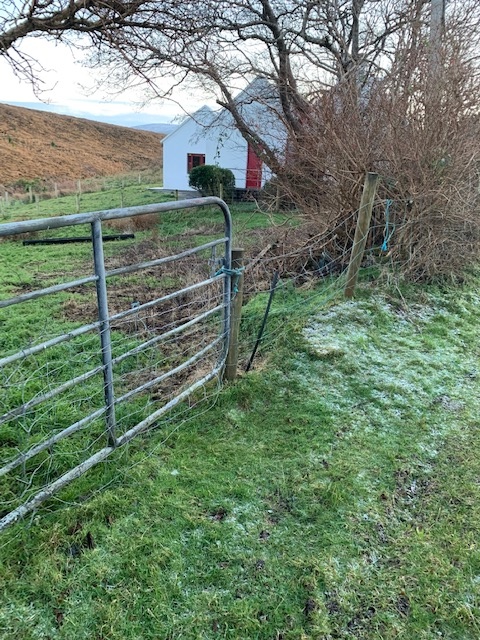 In Heinrich Böll’s cottage on my Achill Island writer’s residency I wrote nearly 20,000 words. I was grateful for the newly installed under-floor heating as I touch-typed, gazing through the window at the rain and hail. In breaks between various types of precipitation I could look out at sudden sunlight spilling silver over the distant grey sea and a vast rainbow arcing from cliff-side to ocean.
In Heinrich Böll’s cottage on my Achill Island writer’s residency I wrote nearly 20,000 words. I was grateful for the newly installed under-floor heating as I touch-typed, gazing through the window at the rain and hail. In breaks between various types of precipitation I could look out at sudden sunlight spilling silver over the distant grey sea and a vast rainbow arcing from cliff-side to ocean.
The black-faced sheep ambled past my window on their thin little black legs and robins, wrens and blackbirds hopped about. One Sunday it was sunny all day and my fifteen minute walk down the hill to the Atlantic Ocean ended in the irresistible urge to paddle in it. I couldn’t come all the way from Australia without at least dipping a toe in. The paddle was chilly at first but so glorious I wished I’d brought my swimming togs.
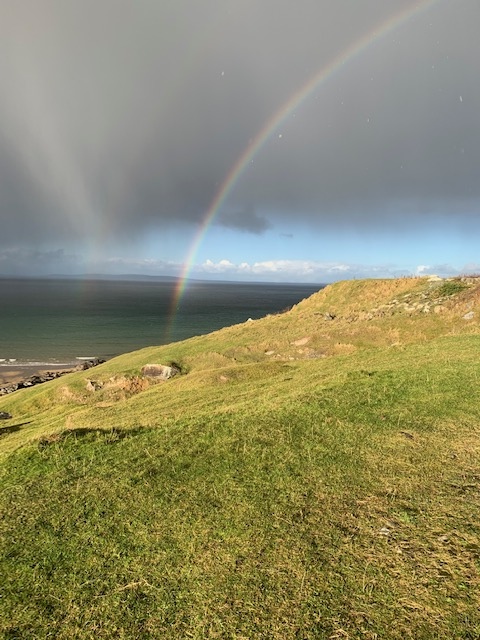 After the recent renovations at Heinrich Böll cottage it seemed that they had not yet put back the books written by former residents. It’s customary to send a sample of one’s writing to a writers residency committee, often the latest book, with one’s application or to send a subsequent publication resulting from the residency. But there were only some books in German or Irish, mostly poetry, possibly Heinrich Böll’s own copies from long ago and of course the books he’d written. Sadly I can read neither German nor Irish.
After the recent renovations at Heinrich Böll cottage it seemed that they had not yet put back the books written by former residents. It’s customary to send a sample of one’s writing to a writers residency committee, often the latest book, with one’s application or to send a subsequent publication resulting from the residency. But there were only some books in German or Irish, mostly poetry, possibly Heinrich Böll’s own copies from long ago and of course the books he’d written. Sadly I can read neither German nor Irish.
Sharon Stone’s The Beauty of Living Twice
The three English language books that were there became my friends at night after a day’s writing. I feel a sentimental attachment to them since I was there alone, with no internet and no TV in a remote area. 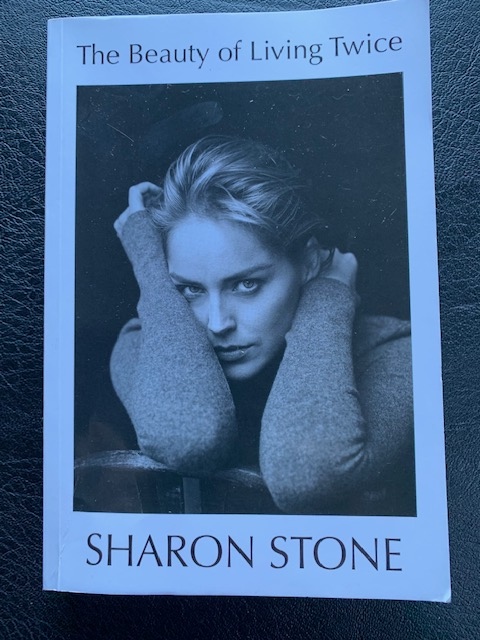 Someone had left behind famous actor Sharon Stone’s recent memoir, The Beauty of Living Twice (Vintage, 2022). Pulling it out, I smiled at the incongruity of this apparition: amidst all the musty, scholarly tomes, here was Sharon Stone’s alluring, cheeky face looking up at me from the cover, and to coin a cliché, dear reader, I leapt on it. And discovered that there is an Irish connection: her tough-love mother was Irish.
Someone had left behind famous actor Sharon Stone’s recent memoir, The Beauty of Living Twice (Vintage, 2022). Pulling it out, I smiled at the incongruity of this apparition: amidst all the musty, scholarly tomes, here was Sharon Stone’s alluring, cheeky face looking up at me from the cover, and to coin a cliché, dear reader, I leapt on it. And discovered that there is an Irish connection: her tough-love mother was Irish.
When Sharon Stone was sixty-three she had a massive stroke with brain haemorrhage and in effect came back from the dead. This gave her a profound perspective about why we are here.
Sharon became the friend I needed at the end of the writing day, someone with a great story to tell, who told it with insight and humour in a lyrical, accessible style. She’s bright and funny and has struggled against fierce odds. She has won many awards for her acting and for the humanitarian causes she works tirelessly for. I loved her book so much that I didn’t want it to end.
Tim Winton’s Eyrie
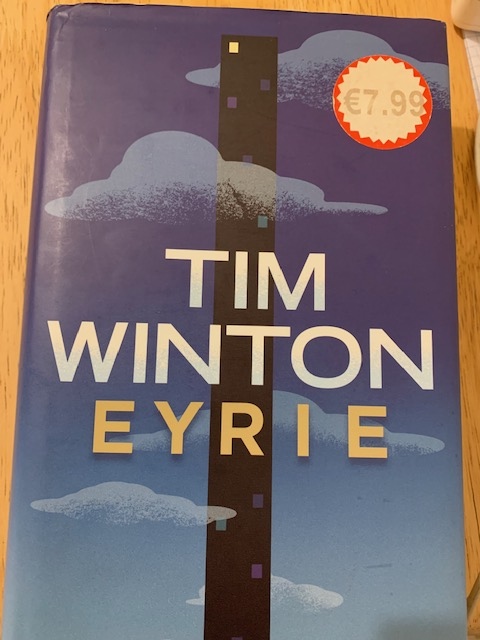 The second book was a Tim Winton novel I hadn’t read: Eyrie (Penguin, 2014). This is a gripping novel about Tom Keely, who has almost given up and is addicted to alcohol plus over-the-counter drugs from the chemist. Choosing to more or less retire from life after disillusion and a traumatic job loss, he is drawn back into life by a mysterious child and his mother. This theme alone would be irresistible enough for me but every page of the writing is stunningly original and funny. Suspenseful too – it’s a real page-turner. The characters – his mother, his ex, Tom Keely himself and the awful high-rise block of flats (‘luxurious apartments,’ of course) he lives in, as authentic a character in the narrative as the people, will all stay with you long after you finish this wonderful, hilarious, pitch-perfect book.
The second book was a Tim Winton novel I hadn’t read: Eyrie (Penguin, 2014). This is a gripping novel about Tom Keely, who has almost given up and is addicted to alcohol plus over-the-counter drugs from the chemist. Choosing to more or less retire from life after disillusion and a traumatic job loss, he is drawn back into life by a mysterious child and his mother. This theme alone would be irresistible enough for me but every page of the writing is stunningly original and funny. Suspenseful too – it’s a real page-turner. The characters – his mother, his ex, Tom Keely himself and the awful high-rise block of flats (‘luxurious apartments,’ of course) he lives in, as authentic a character in the narrative as the people, will all stay with you long after you finish this wonderful, hilarious, pitch-perfect book.
The third book in English at the cottage was a Stanley Tucci recipe book. I took photos of the recipes that looked promising.
The lonely author makes a brilliant discovery: the writer Emilie Pine
When I was able to catch a bus to Westport, over an hour away (buses often not running because of icy roads) I bought two books recommended by my favourite newspaper The Irish Times, and was so glad I did because both authors were as brilliant as the reviewers said. Emilie Pine’s Ruth and Pen (Hamish Hamilton, 2022) and Austin Duffy’s The Night Interns (Granta, 2022).
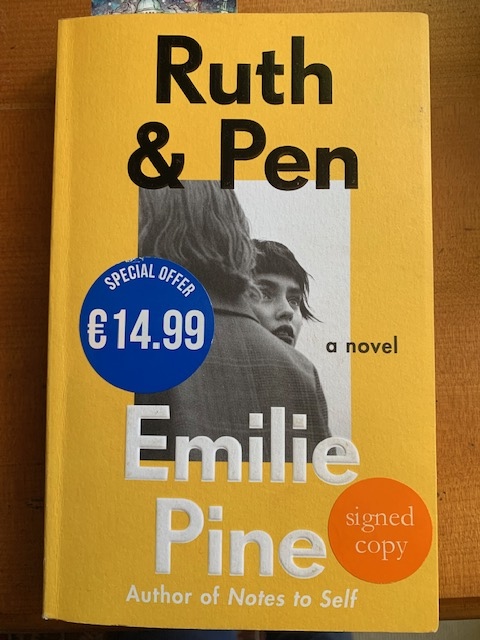 Emilie Pine’s novel is supposed to be her first. That’s hard to believe. All first novels are flawed; this one is flawless. It’s uniquely compelling. Just buy it right now – you won’t regret it. We follow two women who have not yet met during the course of one day. After years of trying IVF Ruth has come to a turning point in her marriage. The teenaged Pen is on the spectrum and riskily determined to reach out further than she ever has before in navigating a more adventurous life for herself. Later that day the two very different women do meet. This novel is beautifully written and its stunningly original language slides us into their bruised and hopeful hearts.
Emilie Pine’s novel is supposed to be her first. That’s hard to believe. All first novels are flawed; this one is flawless. It’s uniquely compelling. Just buy it right now – you won’t regret it. We follow two women who have not yet met during the course of one day. After years of trying IVF Ruth has come to a turning point in her marriage. The teenaged Pen is on the spectrum and riskily determined to reach out further than she ever has before in navigating a more adventurous life for herself. Later that day the two very different women do meet. This novel is beautifully written and its stunningly original language slides us into their bruised and hopeful hearts.
The minute I got back to Dublin I bought Pine’s book of essays, Notes to Self (Penguin, 2018) and this book is equally brilliant. It’s brave and enthralling, containing six honest, accessible essays about our pain and vulnerability in various areas of life, concluding with an exposé of academia today. Sad that it’s not only Australia where academic life has been destroyed.
Austin Duffy’s The Night Interns
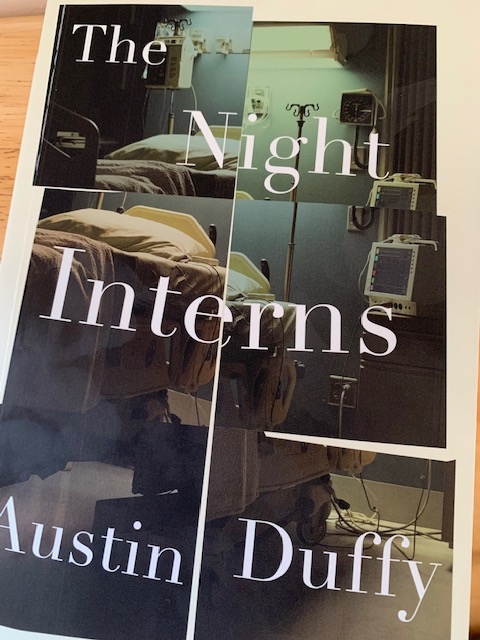 The other book that kept me company at night in the cottage was Austin Duffy’s The Night Interns. I was riveted by this novel’s fascinating grimness. The reader feels as if she’s touching the soul of the exhausted young intern. I felt trapped in the eternal night of an intern also because it’s structured without chapters so the reader begins to feel like the intern, that it’s just relentless and we never get a break! The grim claustrophobic responsibility for life or death is evoked well. I felt that both of us would go mad if the nightmare were not leavened with the wonderful black humour laced through it.
The other book that kept me company at night in the cottage was Austin Duffy’s The Night Interns. I was riveted by this novel’s fascinating grimness. The reader feels as if she’s touching the soul of the exhausted young intern. I felt trapped in the eternal night of an intern also because it’s structured without chapters so the reader begins to feel like the intern, that it’s just relentless and we never get a break! The grim claustrophobic responsibility for life or death is evoked well. I felt that both of us would go mad if the nightmare were not leavened with the wonderful black humour laced through it.
When I closed the cover I thought: if we treated dogs the way we do medical interns it would be illegal. There must be a better way of organising hospitals, especially in the light of recent findings proving that lack of sleep affects us as detrimentally as being drunk does!
No wonder the M and M rate in so many hospitals is so high. M and M? Glad you asked. Morbidity and Mortality. I’ve never forgotten a New Yorker article that opened my eyes to this alarming issue. When the hospital authorities notice that the M and M rates of a particular doctor are unusually high, the person is called in for ‘the Terribly Quiet Chat’ – in the American system at least, the more operations a surgeon does the more he or she is paid. The temptation to cut corners is there.
So these fabulous novels kept me company at night, alone in the cottage, and kept me from thinking about the two documentaries I’d seen not long before, one on Netflix and one, Jim Sheridan’s Murder at the Cottage, on Stan. Both are about the brutal murder of a French writer called Sophie Toscan du Plantier in a very remote part of western Ireland, the suspect being an alcoholic English poet.
A vivid imagination is a tool of the writer’s trade and I did wish I hadn’t seen those disturbing films. (And tried to forget the over-friendly alcoholic English poet I met sometimes on my walks along the beach!) But immersed in my own writing of a new novel during the day and engrossed in the brilliant books of the writers above, one American, one Australian and the rest Irish, my time in Heinrich Böll’s cottage was well spent.
Alannah Hopkin’s A Very Strange Man and Nuala O’Faolain’s Best Love, Rosie
And now I’m reading the other two Irish favourites I posted home after finding them at Charlie Byrne’s bookshop in Galway, Alannah Hopkin’s fascinating memoir of Aidan Higgins, A Very Strange Man and Nuala O’Faolain’s last novel, Best Love, Rosie.
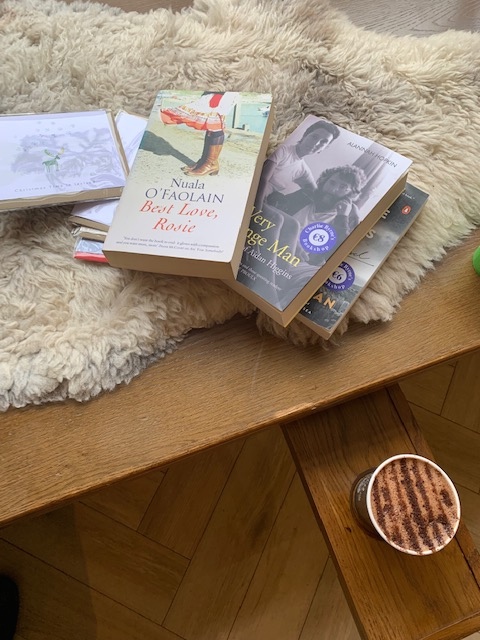 Here they are beside a hot chocolate from Galway’s best chocolate shop, Hazel Mountain – https://www.hazelmountainchocolate.com
Here they are beside a hot chocolate from Galway’s best chocolate shop, Hazel Mountain – https://www.hazelmountainchocolate.com
[contact-form][contact-field label=”Name” type=”name” required=”true” /][contact-field label=”Email” type=”email” required=”true” /][contact-field label=”Website” type=”url” /][contact-field label=”Message” type=”textarea” /][/contact-form]

Leave a Reply